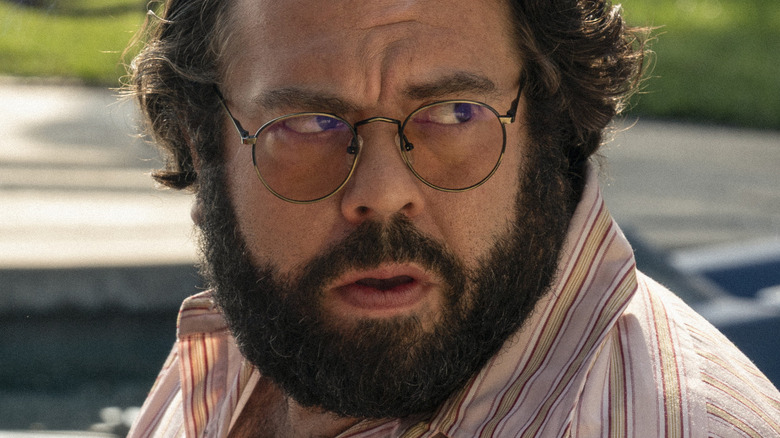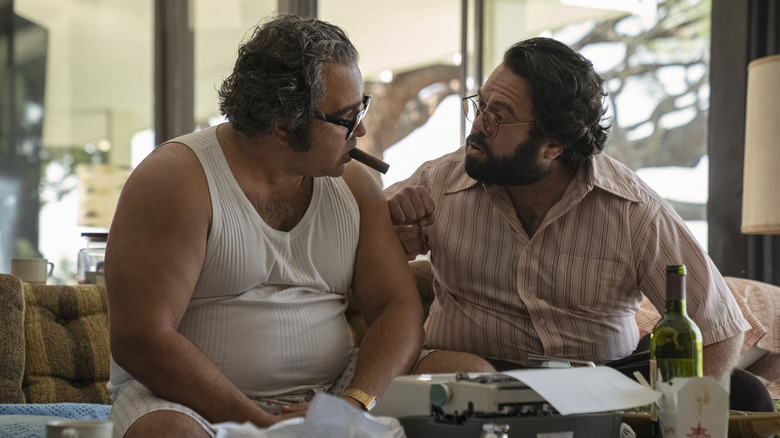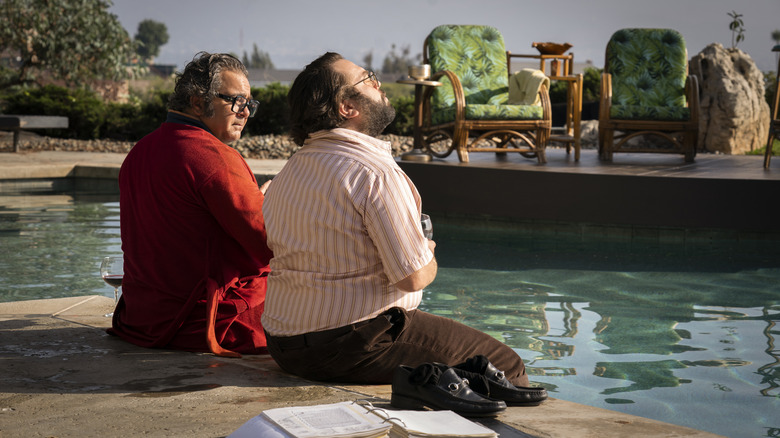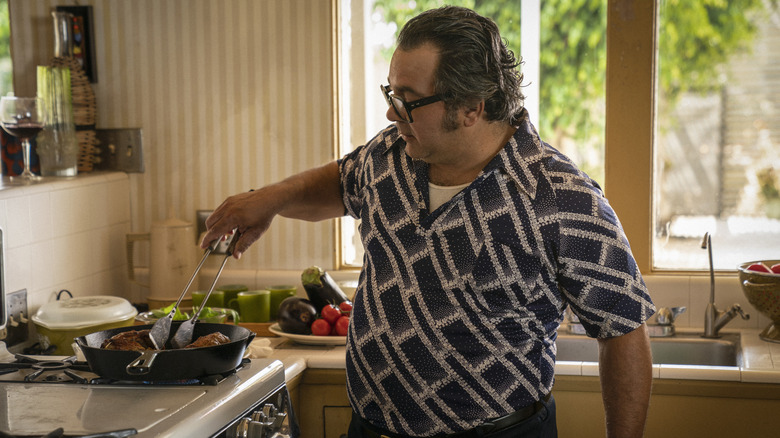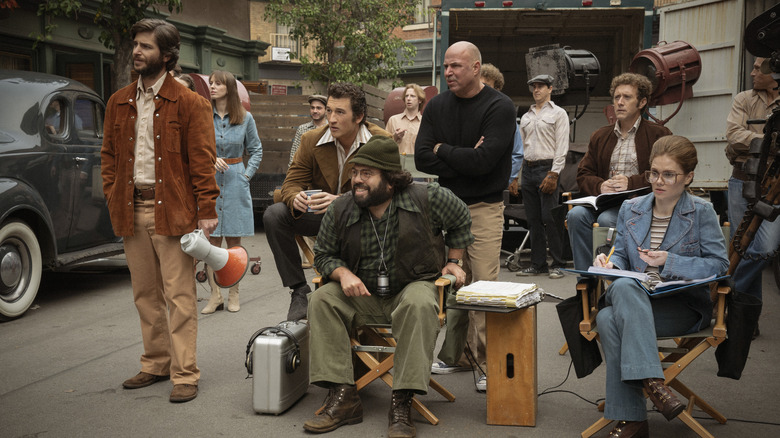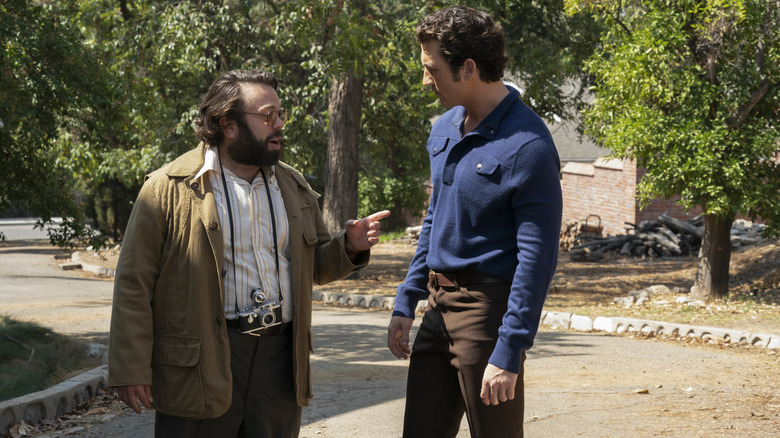Patrick Gallo And Dan Fogler On Making The Offer, Memories Of The Godfather And More - Exclusive Interview
In March of 1972, Paramount Pictures released one of the greatest films of all time, "The Godfather." Based on the best-selling novel by Mario Puzo and directed by Francis Ford Coppola, the epic Mafia drama follows the Corleone crime family as its patriarch, Vito (Marlon Brando), passes the torch to his son Michael (Al Pacino), who is initially not involved in the family business but ends up becoming the most ruthless crime boss of all.
Coppola's masterpiece is the stuff of Hollywood mythology. The studio, owned at the time by Gulf and Western magnate Charles Bludhorn and run by legendary producer Robert Evans, famously battled Coppola over the casting of Brando and Pacino, staying faithful to the novel's setting, and even its runtime, with a coterie of execs and crew members plotting to get Coppola fired at one point.
The production also grappled with the real-life Mafia, which threatened to shut down filming in New York if certain conditions were not met. All this and more is recounted in the new Paramount+ limited series "The Offer," which tells the story mainly from the viewpoint of producer Albert Ruddy (Miles Teller). The cast also including Burn Gorman as Bludhorn, Matthew Goode as Evans, Dan Fogler as Coppola and Patrick Gallo as Puzo.
"The Offer" had its own issues along the way: original star Armie Hammer was replaced by Teller (via Deadline) in early 2021, while a COVID outbreak on set later that summer (allegedly stemming from Teller himself) shut down filming for a time. Plans to shoot at the Chateau Marmont hotel in Hollywood were also sidelined by labor issues (via Deadline) — an ironic parallel to the same tactics that the Mafia tried to use against "The Godfather."
In the end, "The Godfather" achieved the vision that Coppola and others had for it, making it truly one of the most influential films ever. "It's a miracle that it even got made," says Dan Fogler in Looper's interview with him and Patrick Gallo. "That's why ['The Offer'] is such an interesting series."
Gallo and Fogler's Godfather origin stories
What was your first experience with "The Godfather"? Do you remember the first time you saw it?
Patrick Gallo: I was probably around 12 or 13 when I saw it. I came from a world where a lot of the people that were portrayed in "The Godfather" were very similar to the people that were around me and my father, and my father's friends. A lot of them were involved in businesses that weren't exactly on paper. I recognized, watching the film and having sat at the table with policemen and gangsters all sharing the same bowls of pasta and salad, there was a dynamic there that was very familiar to me. When I saw the film, it was like watching home movies. I recognize the personalities, the attitudes, the energy. It was very familiar and it felt I was still home, watching through a keyhole of my own life. It was a mirror of my life, certain aspects of it.
Dan Fogler: When I was growing up, there was this guy that lived on our block, that everyone was pretty sure ran numbers for the mob, and he had this beautiful Jaguar convertible, a classic car, and he fashioned the horn to be the "Godfather" theme. I would hear this when I would go play outside ... the movie's 50 years old already and it's been in my life for my entire life.
Then, as I became a young actor ... Between Part 1 and Part 2, you cover all of the great actors and such amazing performances. I watched it, studying them, and really. that was my master class. Those movies are really when I first started realizing, "Oh, I want to do this stuff." I would pick an actor like Brando or Pacino or De Niro, and reverse engineer, watch all their movies. "Godfather" was the catalyst.
Knowing the real story behind the making of The Godfather
How much of the behind the scenes drama did you know prior to working on this show?
Fogler: I knew from Francis' perspective because there's a lot of behind the scenes footage of Francis talking about how difficult it was to make the movie. He talked about how fondly he loved working with Puzo, but [he also said] every day was a battle to get this movie made. His own job was under scrutiny. They were talking about getting rid of him and replacing him with an action director. I love that, under that pressure, he proved everybody wrong. He made some of the greatest action moments ever.
That's what I think the real throughline is for this show — that it's really hard to make these movies. This is a lot of people's favorite movie, and it almost never got made because so many people were gunning for it. It's a miracle that it even got made. That's why this is such an interesting series.
Patrick, knowing what Puzo himself went through while writing the book and then getting out to Hollywood and watching the movie almost not get made — how much of that were you familiar with?
Gallo: I was familiar with a fair amount, but I knew that there were a lot of struggles. It was nice to find out about Mario's excitement for moving into this new chapter of his life, taking this thing that was already a success and making it a different kind of success, which caused some tension for him. At the same time, what an unbelievable challenge. That's an interesting journey to go on.
The book was already a massive success, and he was very wealthy, but he was able to move into this other genre, this other style of art. Developing this relationship with Coppola ... knowing the kind of joy that he had making this with a fellow artist whom he respected deeply was a cool thing to know. That was inspiring.
Why playing Coppola and Puzo was an offer they couldn't refuse
Since Puzo passed away in 1999, how were you able to access his mannerisms? Was there archival material available to you?
Gallo: There was a little bit available to me, but I didn't want to do a semi-impression of him. It was a little more based in reading his work. He put so much of his life and love in the unbelievable amount of pages that he wrote, in his beautiful poetry. He was a poet, and I really tried to find it in there. I'm not as concerned physically about everything that's happening or doing an impression as much as I am about his love of art, his passion, his love of life and love of family, so that those layers were behind everything that I was saying ... I wanted to make sure it was intact, that his spirit was right there with the scenes that we were doing and the kinds of situations we found ourselves in on set in the story.
Francis, thankfully, is still with us. Did you talk to him, Dan, or reach out to him at all? How did you research playing him?
Fogler: There's a lot of documentary footage on Francis and the way I approached it was ... I've been watching "Hearts of Darkness" since I'm a kid. I gleaned a lot from that, how his relationship is with the actors, how he loves the actors and what kind of passion and energy you have to have, to make something that epic. What was also really a great insight into that specific time, right before "The Godfather," was the documentary that George Lucas made about the making of [early Coppola film] "The Rain People." You see Coppola and all his anxiety, and that he wants so badly to be a respected director. The movie doesn't make such a splash, and you see all of the angst of dealing with that. He's 26 or 27 [with] no beard. It was really helpful to see that.
What's weird is he sounds like my dad. It's very strange. If you told me I was going to play him, I would've said, "Oh, that's strange." I do look like him, and I do sound like him, so it was like stepping into the shoes of an uncle or something.
Making The Offer was like remaking The Godfather
When you were sitting in the director's chair on set, literally recreating scenes from "The Godfather," did it almost feel like you were a kid getting to direct your own version of "The Godfather"?
Fogler: A kid in the candy store. Yes. To have those iconic scenes as a backdrop — any time that we were in the Don's office and especially when you get to see Brando sitting there with the cat, you don't even have to squint your eyes too much. They nailed it. Also, the recreation of Sonny beating up Carlo. [was an] absolute joy, such a joy. What a classy backdrop for our drama, man. I thank my lucky stars every day.
This is a series about the making of a production that had its share of controversies and its share of trouble getting to the screen, but this series had its own issues along the way — the lead actor got replaced, for one. Was there that "meta" feeling in that you were creating a story about this difficult production and at the same time your production's having its own difficulties?
Gallo: The overall production had a few situations and then it was down to a personal level. There were so many parallels occurring that were so similar to stories that were connected to the making of "The Godfather." Not necessarily all the ones that are addressed, but many parallels where ... Danny can agree, we would constantly sit there and be like, "Is that really what's happening right now?"
It's one of those things where you're doing something and the universe keeps telling you [that] you're exactly where you're supposed to be. That's why these parallels are happening. That's why we're giving you so much information to put you in this constant state of awe, to look around and be like, "This is crazy — this is my art imitating life, 100%." We were telling a story about art imitating life. It was all happening at the same time. That happened the entire time we shot, and it made it so much more exciting. You knew you were in the right place.
That's a nice movie you've got there
Is "The Godfather" your favorite movie, and if not, what is your favorite movie?
Gallo: "The Godfather" is one of my favorites ... It's really on a different level. It's really hard to say. My favorite movie of all time? So many people are going to get so upset with me if I say this, but "Step Brothers" — no, that's not it.
Here's my favorite movie of all time. I'm so glad I remembered. I love "The Godfather" and I'm in the making of "The Godfather" and I love it, Paramount+, but my favorite movie of all time that I find myself watching constantly as if I've never seen it before is "Dr. Strangelove." [I] can watch it all the time, over and over again. It makes me feel the same way as it did the first time I saw it. It's an absolute brilliant piece of work.
Fogler: I love "The Godfather" and "The Godfather Part II." I can't figure out which one I like better. If I had to choose, probably [the first one] with Brando, but my favorite is also a Paramount movie, so I can say it. "Raiders of the Lost Ark" is my all-time favorite movie. I hope they do something on Paramount+ with Indiana Jones.
Gallo: I agree with that. The backstory for "Raiders of the Lost Ark" is amazing too. There are so many crazy things that happened.
The first three episodes of "The Offer" are streaming on Paramount+ now, with new episodes premiering on Thursdays.
